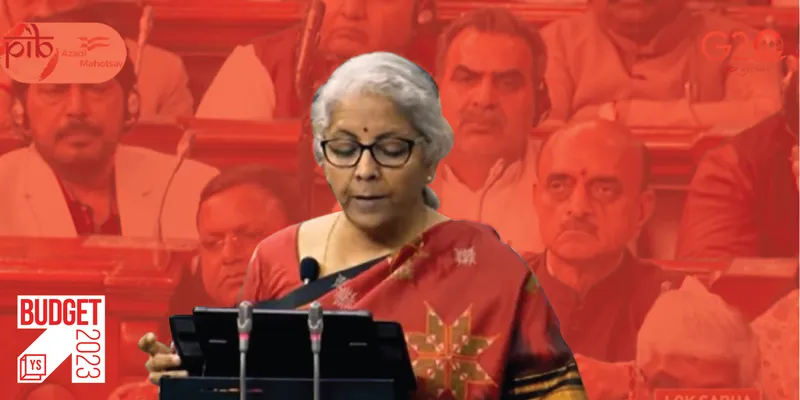Green fuel, MSMEs, employment and skilling: Quick takeaways from Budget 2023
Budget 2023, the first under PM Modi's 'Amrit Kaal', and the final legislative economic blueprint for the BJP prior to general elections, offers a myriad of policies aimed at improving the socioeconomic conditions of women, startup entrepreneurs, the youth, and the middle class.
While Budget 2023 has largely been welcomed, it has also elicited a spectrum of opinions. Some have hailed it as a paragon of balance, others have decried it as populist pandering, and some others have bemoaned its shortcomings.
Budget 2023–the first under PM Modi's 'Amrit Kaal', and the final legislative economic blueprint for the BJP prior to general elections–offers a tapestry of policies: inclusivity, job creation for the youth, promotion of sustainable green energy, tax reliefs for the salaried middle class, and empowerment of women, among others.
There has also been a much-needed emphasis on entrepreneurship and skilling for new technologies, and it's evident the government recognises the potential startups can unlock for India.
Here's a brief summary of this year's Union Budget:
Incentives for startups
The finance minister has proposed extending the date of incorporation for startups to receive income tax benefits from March 31, 2023, to March 31, 2024. The ability to carry forward losses during a change in ownership of startups was also proposed to be increased from seven years after incorporation to ten years.
Additionally, the Budget stipulated the creation of a Rs 10,000 crore fund to provide equity capital to startups. This fund is aimed at boosting the startup ecosystem in the country and helping startups access funding more easily.
The finance Minister also announced plans to launch an innovation challenge for startups to encourage innovation and provide a platform for startups to showcase their ideas.
Credit guarantee scheme for MSMEs
The budget introduced a credit guarantee scheme worth Rs 9,000 crore aimed at providing financial support to MSMEs and helping them access funding more easily. The scheme is expected to provide a much-needed boost to the MSME sector and help them overcome financial difficulties.
With respect to taxation benefits, the finance minister announced that micro-enterprises with a turnover of Rs 2 crore and certain professionals with a turnover of Rs 50 lakh could avail themselves of the benefit of presumptive taxation. She proposed enhanced limits of Rs 3 crore and Rs 75 lakh, respectively, to taxpayers whose cash receipts are no more than 5%.

Skilling the youth in new-age technologies
The government has proposed the launch of Pradhan Mantri Kaushal Vikas Yojana 4.0 (PMKVY) to provide on-job training, industry partnerships, and alignment of courses with industry needs to skill “lakhs of youth within the next three years”. The scheme will include courses like coding, artificial intelligence, robotics, mechatronics, Internet of Things, 3D printing, drones, and soft skills.
Plans also include setting up 30 Skill India International Centres across different states.
Tax relief on income up to Rs 7 lakh
Budget 2023 tweaked some of the slabs to provide relief to the middle class by announcing that no tax would be levied on annual income of up to Rs 7 lakh under the new tax regime.
The budget also allowed a Rs 50,000 standard deduction to taxpayers under the new regime, where assessees cannot claim deductions or exemptions on their investments.
In the Budget for 2023-24, Sitharaman said, currently individuals with a total income of up to Rs 5 lakh do not pay any tax due to rebates under both the old and new regimes.
"I propose to change the tax structure in this regime by reducing the number of slabs to five and increasing the tax exemption limit to Rs 3 lakh," Sitharaman said.
Under the revamped concessional tax regime, no tax would be levied for income of up to Rs 3 lakh. Income between Rs 3-6 lakh would be taxed at 5%; Rs 6-9 lakh at 10%, Rs 9-12 lakh at 15%, Rs 12-15 lakh at 20% and income of Rs 15 lakh and above will be taxed at 30%.
Empowering 81 lakh SHGs
Budget 2023 provided for a savings scheme to ensure the financial independence and security of women. The Mahila Samman Bachat Patra will be a one-time savings scheme for girls and women to save up to Rs 2 lakh at a fixed interest rate of 7.5%, with a facility for partial withdrawal, said the finance minister.
Sitharaman also announced that large producer enterprises or collectives would be formed to empower the self-help groups under the Deendayal Antyodaya Yojana National Rural Livelihood Mission.
Commenting on the success of the mission, Sitharaman said it had mobilised rural women into 81 lakh self-help groups. She said the collectives would each have several thousand members and be managed professionally to enable the groups to reach the "next stage of economic empowerment".
At the start of her speech, the finance minister stated that this year’s Budget is focused on facilitating opportunities for citizens, providing strong impetus to growth and job creation, and strengthening macro-economic stability.

Reducing fiscal deficit to below 4.6% by FY26
Budget 2023 hopes to work towards reducing the fiscal deficit to below 4.5% by FY 2025-26.
FM also said that tax receipts for the next fiscal are budgeted at Rs 23.3 lakh crore and states would be allowed 3.5% of GDP as fiscal deficit.
To finance the fiscal deficit in 2023-24, net market borrowing from dated securities is estimated at Rs 11.8 lakh crore, FM Sitharaman added.
She retained the fiscal deficit target of 6.4% in the revised estimate for FY2022-23 and reduced it to 5.9% for the next fiscal. The government had pegged the fiscal deficit at 6.4% of the GDP for the current financial year.
Aiding traditional artisans and craftspeople
Budget 2023 announced the launch of the PM Vishwakarma Kaushal Samman (PM Vikas) to aid traditional artisans and craftspeople in the country.
"For centuries, traditional artisans and craftspeople, who work with their hands using tools, have brought renown for India. They are generally referred to as Vishwakarma. The art and handicraft created by them represent the true spirit of Aatmanirbhar Bharat," said Sitharaman.
The new scheme will enable traditional artisans to improve the quality, scale, and reach of their products, integrating them with the MSME value chain.
The components of the scheme will include not only financial support but also access to advanced skill training, knowledge of modern digital techniques and efficient green technologies, brand promotion, linkage with local and global markets, digital payments, and social security.
Sector-wise provisions in Budget 2023
Agriculture: Setting up an accelerator fund for startups
To support startups working in the agriculture sector, FM Nirmala Sitharaman announced setting up of an agriculture accelerator fund to “encourage agri-startups by young entrepreneurs in rural areas”.
Millets, which the minister referred to as "Shree Anna", were a highlight of the Budget. The FM said the Hyderabad-based Indian Institute of Millet Research will operate as the Centre of Excellence “for sharing best practices, research, and technologies at the international level”.
Electric vehicles: Custom duty exemptions, but several misses
In an effort to invigorate the electric mobility sector in India, Budget 2023 exempted the import of capital goods and machinery required to manufacture Lithium-ion batteries from customs duty—a formidable triumph for the industry, which has persistently petitioned for such tax breaks.

The finance minister also extended the concessional custom duty of 5% on battery cells for another year to boost the production of Li-ion cells in India, which are currently largely imported from China.
Under the scrapping policy, the government said it will support state bodies in replacing old polluting vehicles, which the EV sector thinks will help people consider electric vehicles as an alternative.
The Budget, however, failed to meet several expectations put forth by the industry, particularly around the extension of the Faster Adoption and Manufacturing of Electric Vehicles (FAME II) subsidies.
Green energy: Govt on Mission Mode to achieve net-zero carbon emission
Budget 2023 set aside Rs 35,000 crore for investments in energy transition and net-zero objectives.
"India is moving forward firmly for the panchamrit and net-zero carbon emission by 2070 to usher in green industrial and economic transition. This Budget builds on our focus on green growth," the FM said.
An inter-state transmission system at an investment of Rs 20,700 crore will be constructed to evacuate and integrate 13 gigawatt of renewable energy from Ladakh.
A Green Credit programme will be notified under the existing Environment (Protection) Act, under which environmentally responsible companies, local bodies and individuals, among others, will be incentivised.
The finance minister also acknowledged the role of the National Green Hydrogen Mission, which recently received an outlay of Rs 19,700 crore. "(It) will facilitate transition of the economy to low carbon intensity, reduce dependence on fossil fuel imports, and make the country assume technology and market leadership in this sunrise sector," she said.
Fintech: Setting up for smoother processes
The government in Budget 2023 moved to enable greater fintech adoption, leveraging DigiLocker and Aadhaar to simplify the KYC process, and PAN as a common identifier for businesses for all digital systems of specific government agencies.
DigiLocker and Aadhaar will serve for updating and reconciling the identity and address of individuals maintained by government agencies and regulators, Sitharaman said.
“To enable more fintech innovative services, the scope of documents available in DigiLocker for individuals will be expanded,” she added.
Further, the government will set up an enterprise-level DigiLocker for small and large businesses, as well as for charitable trusts, for storing and sharing documents online securely with various authorities, regulators, banks and other business entities.
Budget 2023 also lowered the allocation meant for compensating fintech startups and banks that facilitate free UPI transactions, disappointing industry stakeholders who had been demanding a significant increase from last year’s outlay.
An allocation of Rs 1,500 crore for the promotion of digital payments has been proposed--much lower than the revised allocation of Rs 2,137 crore for 2022-23, which had been bumped up from the earlier outlay of Rs 200 crore after multiple stakeholders, including the Reserve Bank of India, warned that a zero MDR regime would adversely affect the growth of the digital payments ecosystem.
Pharmaceutical: Govt announces new programme launches
Budget 2023 announced the launch of a new programme to promote research in pharmaceuticals with a view to promoting growth in the sector. Facilities in select Indian Council of Medical Research (ICMR) labs will be made available for research by public and private medical faculties, Sitharaman said.
(This story has been updated to add details.)
Edited by Megha Reddy









